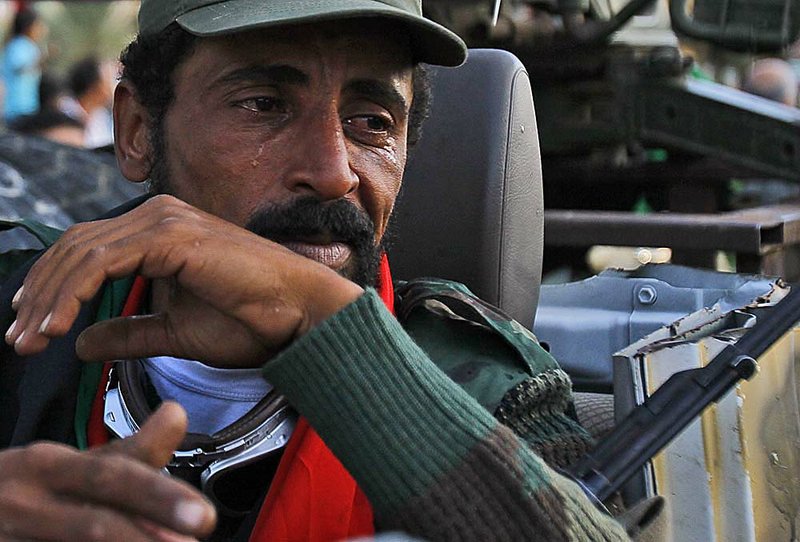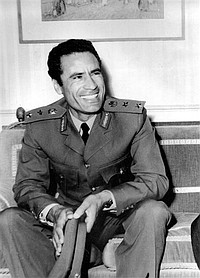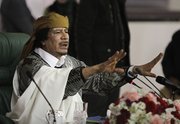MISRATA, Libya — After 42 years of absolute power in Libya, Moammar Gadhafi spent his last days in states of defiance, anger and delusion, surviving on rice and pasta that his guards scrounged from the emptied civilian houses he moved between every few days, according to a senior security official captured with him.
Under siege by the former rebels for weeks, Gadhafi grew impatient with life on the run in the city of Sirte, said the official, Mansour Dao, the leader of the country’s People’s Guard, a network of loyalist volunteers and informants. “He would say: ‘Why is there no electricity? Why is there no water?’”
Dao, who stayed close to Gadhafi throughout the siege, said he and others repeatedly counseled Gadhafi to leave power or the country, but Gadhafi and one of his sons, Muatassim, would not even consider the possibility.
Still, though some of Gadhafi’s supporters portrayed him to the end as eager to fight, armed at the front lines, he did not take part in the fighting, Dao said, instead preferring to read or make calls on his satellite phone.
“I’m sure not a single shot was fired,” he said.
Libya’s interim leaders prepared Saturday to formally start the transition to an elected government and set a time line for national elections in 2012, announcing that they will declare liberation today.
Dao’s comments, in an interview Saturday at the military intelligence headquarters in Misrata, came as the final details of Gadhafi’s death, at the hands of the fighters who had captured him, were still being debated.
Residents of Misrata spent a third day viewing the bodies of Gadhafi and his son in a meat locker at a local shopping mall. Officials with the interim government have said they will conduct an autopsy on the bodies and investigate allegations that the two men were killed while in custody, though local security officials have said they see no need for such an inquiry.
The bodies of Muatassim and his ex-defense minister Abu Bakr Younis also were put on display Saturday, although they were covered with blankets so only their faces were visible.
Abdel-Basit al-Mzirig, the deputy justice minister, said Gadhafi will be buried according to Islamic tradition, but his burial place will be kept secret.
Dao, who was said to be a cousin of Gadhafi and became a member of his trusted inner circle, spoke in a large conference room that served as his cell. He wore a blanket on his legs and a blue shirt, that was possibly an electric company uniform inscribed with the word “power.”
His account of the fighting did not address the accusations made by the former rebels of abuses by loyalist forces inside Sirte. Ismael al-Shukri, the deputy chief of military intelligence in Misrata, said loyalists had used families as human shields and that there were reports that loyalist soldiers had detained daughters to prevent families from leaving. The former rebels have also said the Gadhafi forces executed soldiers who refused to fight.
Gadhafi fled in a small convey to Sirte on Aug. 21, the day Tripoli fell. “He was very afraid of NATO,” said Dao, who joined him about a week later. The decision to stay in the city had been Muatassim’s, who reasoned that the city, long known as an important pro-Gadhafi stronghold and under frequent bombardment by NATO airstrikes, was the last place anyone would look for him.
Gadhafi traveled with about 10 people, including close aides and guards. Muatassim, who commanded the loyalist forces, traveled separately from his father, fearing that his satellite phone was being tracked.
Apart from the phone, which Gadhafi used to make frequent statements to a Syrian television station that became his official outlet, he was largely “cut off from the world,” Dao said. He did not have a computer, and in any case, there was rarely any electricity. Gadhafi, who was fond of framing the revolution as a religious war between devout Muslims and the rebel’s Western backers, spent his time reading the Koran, Dao said.
He refused to hear pleas to give up power. He would say, according to Dao: “This is my country. I handed over power in 1977,” referring to his oft-repeated assertion that power was actually in the hands of the Libyan people. “We tried for a time, and then the door was shut,” the aide said, saying that Gadhafi seemed more open to the idea of giving up power than his sons were.
For weeks, the former rebels fired heavy weapons indiscriminately at the city. “Random shelling was everywhere,” said Dao, adding that a rocket or a mortar shell struck one of the houses where Gadhafi was staying, injuring more of his guards. A chef who was traveling with the group was also hurt, so everyone started cooking, Dao said.
About two weeks ago, as the former rebels stormed the city center, Gadhafi and his sons were trapped in two houses in a residential area called District No. 2. Gadhafi decided it was time to leave and planned to flee to one of his houses nearby, where he had been born.
On Thursday, a convoy of dozens of cars was supposed to leave about 3 a.m., but disorganization by the loyalist volunteers delayed the departure until 8 a.m. In broad daylight, the NATO warplanes and former rebel fighters found the convoy half an hour after it left.
Dao said he was hit by shrapnel, and when he woke up, he was in the hospital.
“I’m sorry for all that happened to Libya,” he said, “from the beginning to the end.”
LOOKING AHEAD
With Gadhafi gone, the governing National Transitional Council was moving forward with efforts to transform the country that was ruled by one man for more than four decades into a democracy.
In Tripoli, residents said they were relieved that Gadhafi was killed, not captured, allowing the nation to move forward without fear that his supporters would try to sabotage the transition to democracy.
“If there was a trial, it would take some time. ... Maybe there would be revenge attacks,” said Hosni Bashir, an oil worker who was attending the first meeting of a new political party in a Tripoli hotel. “Now, they [Libya’s new leaders] can start.”
Initially, National Transitional Council officials said the declaration of liberation would be made Saturday. But spokesman Abdel-Rahman Busin said preparations were under way for a ceremony today in the eastern city of Benghazi, the revolution’s birthplace.
The transitional leadership has said it would declare a new interim government within a month of liberation and elections for a constitutional assembly within eight months to be followed by a parliamentary and presidential vote within a year.
On Saturday, acting Prime Minister Mahmoud Jibril, who has said he plans to resign after the liberation, said the interim government “should last until the first presidential elections.”
Speaking at the World Economic Forum on the Jordanian shores of the Dead Sea, he also said the transitional council must move quickly to disarm rebels who helped to overthrow Gadhafi’s regime. He said it was a priority to ensure that huge caches of weapons are turned in over the “next few days.”
Jibril also said the Libyan people must remember the agony of the past and choose a different path for the future. He said he was “relieved” after Gadhafi’s ouster, describing it as a “great moment in my life.”Information for this article was contributed by Kareem Fahim and Suliman Alzway of The New York Times; and by Kim Gamel, Karin Laub, Rami al-Shaheibi, Hadeel al-Shalchi, Sarah El Deeb and Dale Gavlak of The Associated Press.
Front Section, Pages 1 on 10/23/2011


